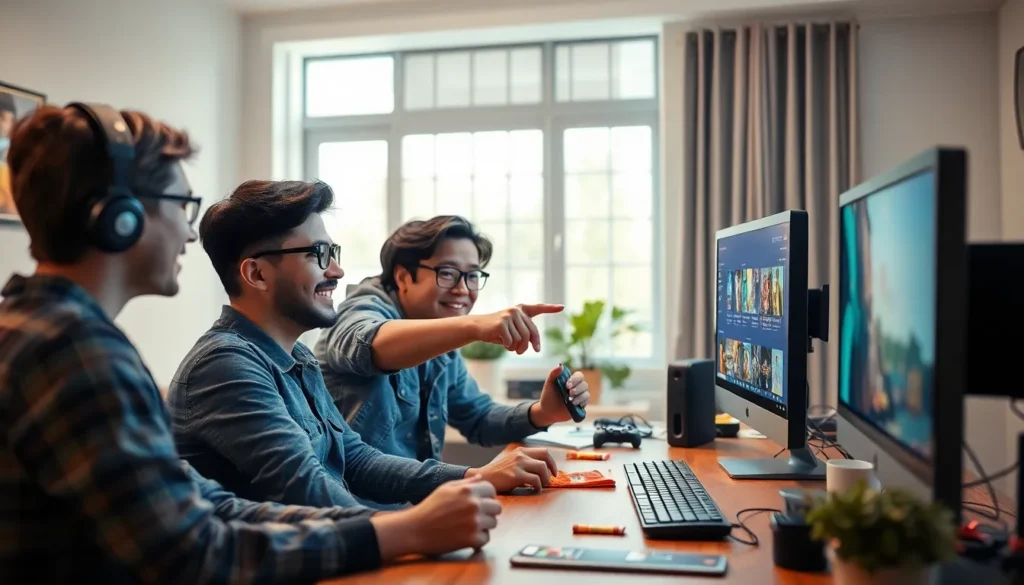Table of Contents
ToggleImagine walking into a workshop where every detail sparks creativity and collaboration. That’s the magic of effective workshop design. It’s not just about tables and chairs; it’s about crafting an experience that unleashes potential and keeps participants engaged. Whether it’s a brainstorming session or a hands-on training, the right design can transform a mundane meeting into an unforgettable adventure.
Overview of Workshop Design
Effective workshop design emphasizes creating an environment that fosters engagement. Participants benefit from thoughtfully arranged spaces that encourage collaboration. Consideration of participants’ needs and preferences plays a crucial role in the planning process. Engaging activities and innovative approaches enhance the overall experience.
Spatial layout significantly affects interaction. Flexible seating arrangements enable small group discussions and large group sessions. Integrating technology, such as projectors and interactive whiteboards, leads to dynamic engagement. Noise control and lighting influence the atmosphere and concentration levels.
Materials also contribute to workshop success. Providing relevant resources, such as handouts and tools, aids participants in achieving objectives. Selecting diverse materials caters to various learning styles, enhancing retention and comprehension. Offering choices in activity types boosts motivation and investment.
Facilitator skills shape the workshop’s effectiveness. A well-prepared facilitator guides discussions, encourages participation, and adapts to group dynamics. Engaging storytelling and asking open-ended questions stimulate critical thinking. Incorporating feedback mechanisms ensures continuous improvement in future workshops.
Finally, the workshop’s purpose guides all aspects of design. Clear objectives help the facilitator focus on desired outcomes. Connecting goals with activities ensures alignment throughout the session. Structure and flow support participant engagement and enhance the learning experience.
Key Elements of Effective Workshop Design

Effective workshop design incorporates several key elements to foster a successful experience for participants. Understanding these elements enhances the overall engagement and learning outcomes.
Learning Objectives
Clear learning objectives act as a roadmap for both facilitators and participants. These objectives define what participants should accomplish by the end of the workshop. It’s essential to align activities with objectives to maintain focus. Crafting specific and measurable goals promotes accountability and direction. Participants benefit from knowing what to expect, which increases motivation and participation. Consider using the SMART criteria—specific, measurable, achievable, relevant, and time-bound—when developing these objectives.
Engagement Strategies
Innovative engagement strategies transform passive learning into active participation. Utilizing interactive activities encourages collaboration and discussion among participants. Techniques such as brainstorming sessions, role-playing, and small group discussions can enhance involvement. Visual aids can capture attention and support diverse learning styles. Providing opportunities for participants to share their insights fosters a sense of ownership in the learning process. Variability in activities prevents monotony and maintains energy levels throughout the workshop.
Assessment Methods
Assessment methods evaluate participant understanding and workshop effectiveness. Both formative and summative assessments provide valuable feedback. Implementing quick polls, quizzes, or open-ended reflections can gauge comprehension in real-time. Collecting participant feedback through surveys post-workshop aids in identifying successes and areas for improvement. Utilizing peer assessments fosters collaboration and critical thinking. By systematically assessing learning outcomes, facilitators can refine future workshops to enhance participant engagement and satisfaction.
Types of Workshop Designs
Workshop design varies significantly based on delivery methods and participant needs. Understanding these types helps in creating engaging experiences.
Traditional Workshops
Traditional workshops occur in a physical space, facilitating face-to-face interaction. Participants engage directly with facilitators and peers, enhancing collaboration. Utilizing movable furniture allows for dynamic seating arrangements that support both group discussions and activities. Various tools, such as flipcharts and handouts, can be used to cater to diverse learning preferences. This format benefits from immediate feedback and the ability to read non-verbal cues, fostering deeper connections among participants.
Online Workshops
Online workshops leverage digital platforms to connect participants remotely. These workshops enable greater accessibility for individuals across different geographical locations. Engagement tools like polls and breakout rooms help create an interactive environment. The integration of multimedia elements, such as videos and presentations, enhances the learning experience. Quick chats and Q&A sessions allow for real-time feedback, addressing issues as they arise. Overall, online workshops present unique opportunities for flexibility and convenience.
Hybrid Workshops
Hybrid workshops blend traditional and online formats, accommodating various participant preferences. This design allows in-person attendees to engage alongside virtual participants. Technology facilitates seamless communication between both groups, ensuring everyone contributes to discussions. Flexible content delivery supports engagement for different learning styles. Additionally, this format expands accessibility, allowing those unable to attend in person to participate fully. Hybrid workshops maximize the strengths of both approaches, creating versatile and inclusive learning experiences.
Common Challenges in Workshop Design
Effective workshop design faces several challenges that can impede participant engagement and overall success. Identifying and addressing these obstacles is crucial for creating memorable experiences.
Participant Engagement
Participants often struggle to stay engaged during workshops. This challenge arises from inadequate interaction and monotonous presentation styles. Facilitators can encourage engagement by incorporating interactive activities that prompt discussion and collaboration. Open-ended questions stimulate critical thinking while personalizing content can resonate with diverse learning styles. Ensuring a mix of group work and individual tasks maintains energy levels throughout the session.
Resource Management
Managing resources effectively represents another challenge in workshop design. Limited budgets can restrict access to quality materials or technology necessary for enhancing the experience. Assessing resource needs prior to the workshop streamlines planning and minimizes last-minute complications. Prioritizing essential tools and materials that support learning objectives is vital. Flexibility in resource allocation allows facilitators to adapt as necessary, ensuring all participants receive a valuable experience despite constraints.
Best Practices for Successful Workshop Design
Successful workshop design relies on several best practices that enhance participant engagement and learning outcomes. Establish clear learning objectives. These objectives provide a roadmap for facilitators, ensuring activities align with desired outcomes. Incorporate the SMART framework—specific, measurable, achievable, relevant, and time-bound objectives foster focus.
Engagement strategies matter greatly. Utilize interactive activities and visual aids to move from passive learning to active participation. Changing activities frequently maintains energy levels and supports various learning styles, helping all participants stay motivated.
Fostering a supportive environment is essential. Consider flexible seating arrangements that facilitate small group discussions as well as larger sessions. Such arrangements boost interaction and collaboration among participants, allowing them to feel more comfortable sharing ideas.
Employ technology wisely. Integrating digital tools enhances communication and interactivity during both in-person and online workshops. Tools like polls and breakout rooms can encourage participation and generate instant feedback, driving participant engagement.
Facilitators play a crucial role in shaping the workshop’s success. Mastering the art of guiding discussions and adapting to group dynamics can significantly impact the overall experience. Engaging storytelling and open-ended questions prompt critical thinking, while feedback mechanisms provide insights for future improvement.
Assessment methods also contribute to effectiveness. Implement formative and summative assessments, such as quick polls and feedback surveys, to gauge participant understanding. Consistent assessment allows facilitators to refine their approach, ensuring workshops continually evolve to meet participant needs.
Addressing common challenges requires attention. Inadequate interaction often leads to disengagement among participants. Incorporating interactive activities can mitigate this issue, stimulating discussions and enhancing the overall experience. Additionally, understanding resource limitations helps facilitators streamline planning and maximize the use of available materials.
Effective workshop design is crucial for creating engaging and memorable experiences. By focusing on clear learning objectives and incorporating interactive elements, facilitators can enhance participant involvement and satisfaction.
Utilizing flexible seating arrangements and technology fosters collaboration and communication, while diverse materials cater to various learning styles. Assessing outcomes ensures continuous improvement, enabling facilitators to refine their approach for future workshops.
Ultimately, a well-designed workshop not only meets educational goals but also inspires creativity and teamwork among participants. Embracing these principles will lead to more successful and impactful workshops in any setting.





